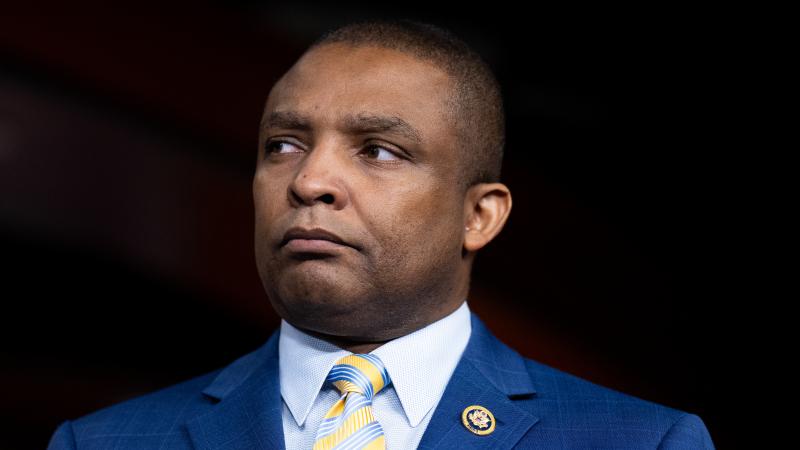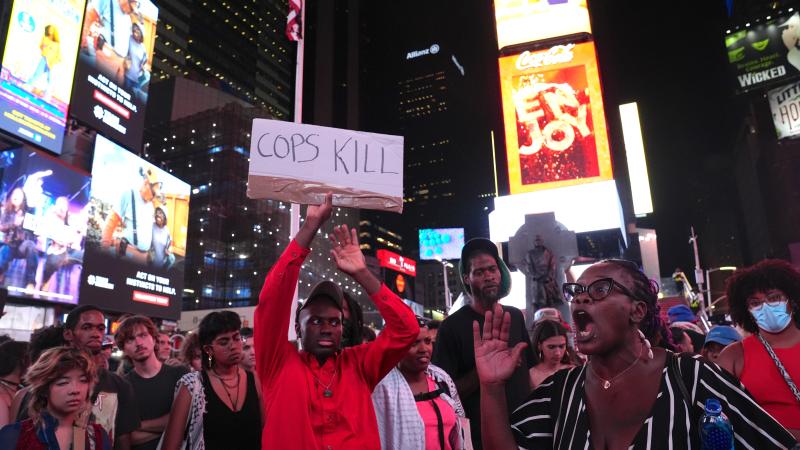Progressive lawmakers offer unwitting path for Jan. 6 prisoners to sue federal government
Bill sponsored by Democratic Reps. Hank Johnson, Jamie Raskin would allow citizens to recover damages for constitutional violations.
Some of the most progressive Democrats in Congress are supporting new legislation that could help an unexpected group: those who were arrested and imprisoned without trial for playing a role in the Jan. 6 Capitol riot.
Democratic Reps. Hank Johnson (Ga.) and Jamie Raskin (Md.) on Wednesday reintroduced the Bivens Act, which would allow citizens to recover damages for constitutional violations committed against them by federal law enforcement officials.
The bill, which the lawmakers first introduced last year, seeks "to provide a civil remedy for an individual whose rights have been violated by a person acting under federal authority." It would do this by adding five words — "of the United States or" — to a longstanding provision enacted in 1871, known as Section 1983, which gives individuals the right to sue state or local officials who violate their civil and constitutional rights. The additional words would include federal officials in the statute.
The FBI, Justice Department, Transportation Security Administration (TSA), U.S. Immigration and Customs Enforcement (ICE), and federal prison officials are among the law enforcement entities that would be held accountable under the legislation.
Sen. Sheldon Whitehouse (D-R.I.) introduced a companion bill in the Senate this week.
Supporters of the legislation argue that no statute, including Section 1983, currently gives individuals the right to sue federal officials who violate the Constitution. Johnson and Raskin said as much in a press release, pointing to the former Trump administration as reason to pass their bill.
"Victims of constitutional violations by federal officers too often have no legal recourse," Johnson said. "From ICE officers who conduct illegal searches and seizures and Bureau of Land Management officials who intimidate property owners into providing easements to the peaceful protesters who were violently dispersed from Lafayette Square with teargas and rubber bullets last summer so [President] Trump could get his Bible photo op — they are all too often immunized from damages for their constitutional wrongs."
Raskin also focused on last year's incident at Lafayette Square in Washington, D.C. Neither congressman mentioned the report from the Department of the Interior's inspector general, who found that U.S. Park Police was unaware of President Trump's impending visit and had instead cleared the area to allow a contractor "to safely install the anti-scale fencing in response to destruction of property and injury to officers" that had occurred there days before.
"The Bivens Act will finally codify the people's right to seek damages from the federal government when their constitutional rights have been violated," Raskins said. "Just last year, we watched then-Attorney General Barr unleash a ragtag paramilitary squad of federal law enforcement officers to deploy tear gas, pepper spray, and rubber bullets against peaceful protestors in Lafayette Square.
"Many of those injured that day, including several of my constituents, may find themselves without an effective legal remedy. This bill will right that wrong by allowing affected citizens to recover damages and hold federal law enforcement officials accountable for misconduct."
While Johnson and Raskins framed their bill as a way to protect against the overreaches of the Trump administration, the legislation would incidentally offer a path to civil remedy for those imprisoned without trial for alleged involvement in the Jan. 6 Capitol breach who say they've been mistreated by federal authorities to sue.
Several Jan. 6 prisoners allege the FBI, Justice Department, and federal prison officials under the Biden administration have violated their civil and constitutional rights.
Thomas Caldwell, 66, for example, says he was arrested at his Virginia farm in January and interrogated for hours without being told what he was being charged with. Caldwell, a military veteran, never entered the Capitol building on Jan. 6 but spent well over a month in solitary confinement.
George Tanios, 40, says he had a similar experience at his West Virginia home in March, claiming federal agents wouldn't answer him when he asked why they were arresting him. He was imprisoned on charges related to the death of Capitol Police Officer Brian Sicknick and remained in jail for months, despite the District of Columbia's chief medical examiner concluding Sicknick died of unrelated natural causes. According to Tanios, his business was devastated as a result of his arrest and imprisonment.
Christopher Worrell was also arrested and imprisoned for his involvement in the Capitol riot despite never entering the building. In October, a federal judge found D.C. Jail Warden Wanda Patten and D.C. Department of Corrections Director Quincy Booth in contempt of court for refusing to turn over records related to the care of Worrell, who suffers from non-Hodgkin's lymphoma and had a broken hand. The judge referred the matter to the attorney general "for appropriate inquiry into potential civil rights violations of Jan. 6 defendants, as exemplified in this case."
Worrell's lawyer said his client was subjected to "cruel and unusual punishment" in the jail that houses most of the Jan. 6 prisoners. The D.C. jail has come under heightened scrutiny in recent weeks over its conditions and treatment of inmates.
The U.S. attorney for D.C. is the federal official primarily leading the prosecution of Jan. 6 defendants. The position is appointed by the president.
It's unclear whether Johnson, Raskins, or Whitehouse were aware their bills would potentially provide legal recourse for Jan. 6 prisoners. Raskins's office had no comment when asked whether he'd considered this possibility before cosponsoring the legislation and whether he had any problem with the prospect of Jan. 6 prisoners using his bill as a way to sue the Biden administration for alleged mistreatment.
Johnson and Whitehouse's offices didn't respond to requests for comment.
Some of the most outspoken progressives in Congress are supporting the Bivens Act, including Democratic Reps. Ted Lieu (Calif.), Andre Carson, (Ind.), Rashida Tlaib (Mich.), Sheila Jackson Lee (Texas), and Alexandria Ocasio-Cortez (N.Y.), among others.
In the Senate, Democratic Sens. Alex Padilla (Calif.), Ed Markey (Mass.), and Ron Wyden (Ore.) have cosponsored Whitehouse's bill.
It remains to be seen whether the bill will receive bipartisan support. However, the idea of giving citizens greater ability to sue the federal government has backing among many Republicans as well as Democrats.
"The problem with the current lack of recourse for citizens whose constitutional rights are violated by government officials is that there is no legal recourse for them — meaning innocent victims exclusively bear the brunt of errors that should be borne by taxpayers," said Harmeet Dhillon, an attorney and CEO of the Center for American Liberty who currently serves as chair of the Republican National Lawyers Association.
"The principle that those who cause harm should be held accountable is something that all Americans should be able to get behind," Dhillon continued. "As a civil rights lawyer who has sued the government countless times for violating the civil rights of ordinary Americans, I think it is high time that we not only institute statutory remedies for injured Americans, but also that we revisit the overbroad, unjust, and impossible to meet standard of qualified immunity with a clear norm that more reasonably balances the interests of society in hiring and retaining good public servants, with the accountability that must come when mistakes — or worse — are made."Dhillon didn't comment on the specifics of the Bivens Act.














